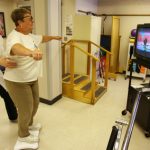 Earlier this year I wrote about some fascinating virtual reality applications that were being used to help people rehabilitate from various illnesses. Central to the success of these applications was the ability to gamify the rehab process, with participants found to persist longer with their programs and enjoy rehab more than those without such support.
Earlier this year I wrote about some fascinating virtual reality applications that were being used to help people rehabilitate from various illnesses. Central to the success of these applications was the ability to gamify the rehab process, with participants found to persist longer with their programs and enjoy rehab more than those without such support.
Researchers from Purdue University are also taking a gamified approach to their work by deploying the Nintendo Wii gaming system to support people with Parkinson’s disease. The team hope their work will improve the movement, speech and general quality of life of the patient.
Gamifying Parkinson’s
Participants were required to stand on a balance board whilst moving a cursor to a specific target on the monitor in front of them. They were connected up so that the researchers could monitor brain activity and see how this linked with the body movements of the player.
“We’re looking at being able to do things in their house that may be challenging, like put away groceries when you have to stand on your toes and reach for cabinets, or to cook and communicate at the same time” the researchers say. “All these things that people, when they’re younger, take for granted that get more difficult to perform as they get older, and even more so if they have some sort of neuromuscular disease.”
In an initial pilot study, the researchers found that the people using the gamified approach tended to do better in terms of gait and balance than those following more traditional treatments. The researchers also believe the method could support speech therapy.
“As speakers, we typically take pauses at set locations – a major thought, a minor thought, not really in the middle of a thought,” they say. “After therapy with this, their pauses were more typically placed. They didn’t pause as often in unexpected locations.”
As yet the team are unsure on just why the gamified approach delivered such positive results, but they plan to conducted a full, randomized control trial to explore this in depth. It’s something they eventually hope to offer to patients from home, with therapists checking in on the patient remotely to see not only whether they’re doing the exercises, but how they did in them.
The project also highlighted the positive impact the games had on the enjoyability of therapy. The participants were required to do three sessions per week for eight weeks, so ensuring it was fun was crucial. The team hope to build on these initial successes however and make the game even more engaging.
“We’ve learned some things that we’ll try to implement to make it more exciting,” they say. “More games, and eventually being home-based, will probably make this more enjoyable than going to a physical therapy clinic, just not as fun as going and partying with their friends.”
It’s a fascinating project and another example of how technology is helping a range of conditions. Check out the video below to see the game in action.